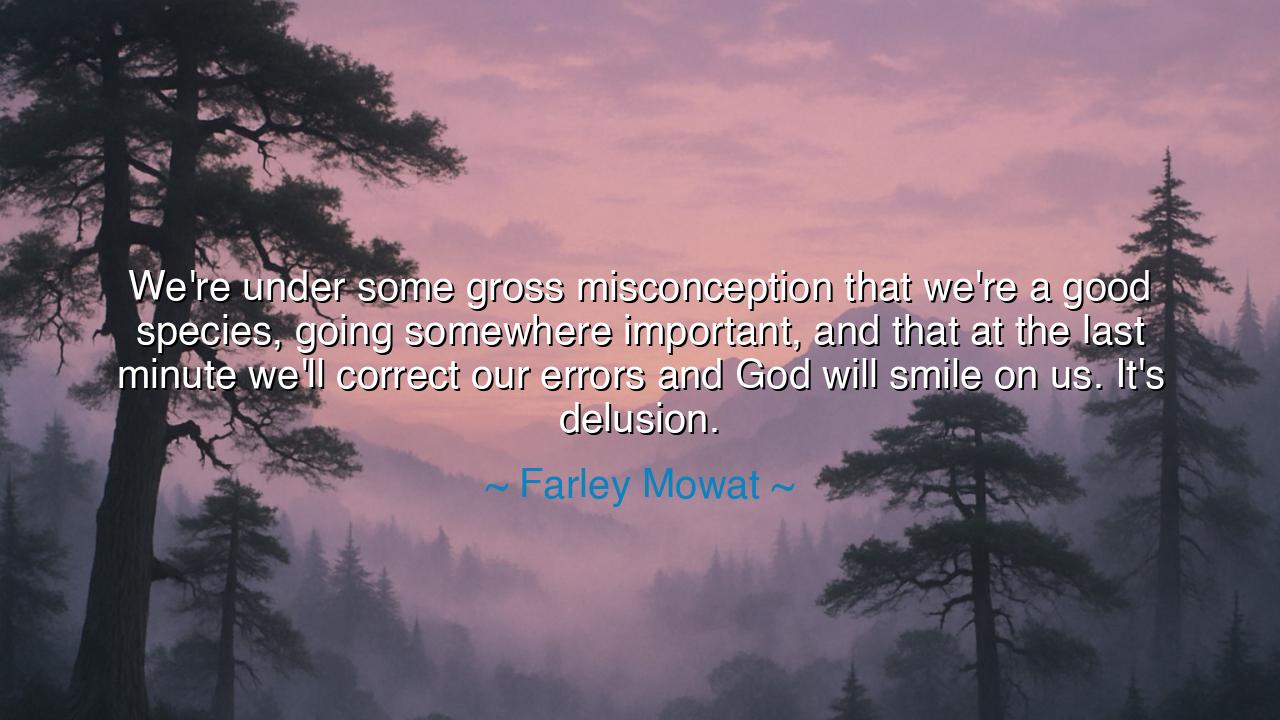
We're under some gross misconception that we're a good species
We're under some gross misconception that we're a good species, going somewhere important, and that at the last minute we'll correct our errors and God will smile on us. It's delusion.






The words of Farley Mowat, “We’re under some gross misconception that we’re a good species, going somewhere important, and that at the last minute we’ll correct our errors and God will smile on us. It’s delusion,” strike like thunder across the valleys of human pride. They are not gentle words, nor are they meant to comfort. They are the stern cry of one who has looked upon the works of humankind—our destruction of the earth, our wars, our arrogance—and found little to praise. Mowat calls us to see the truth, however bitter: that we imagine ourselves noble, destined, redeemed, when in fact we may be lost in self-deception.
At the heart of his statement lies the idea of misconception. Humanity often cloaks itself in illusions. We believe ourselves to be the crown of creation, the chosen species, the stewards of the earth. We invent stories of destiny and progress, as though our path must lead toward greatness. But Mowat tears this veil away, declaring that such beliefs may be nothing more than vanity. To wait for divine mercy while continuing to destroy and exploit is not faith—it is delusion.
The ancients, too, spoke of this folly. The Greeks told of Icarus, who soared too close to the sun, intoxicated by pride, only to fall into the sea. The prophets of Israel warned their people not to believe that rituals or words alone would bring God’s favor while injustice filled their streets. In every age, sages have cautioned humanity against believing that destiny or last-minute repentance will erase the consequences of our actions. Mowat, in his modern tongue, is echoing this eternal warning.
Consider the devastation of the natural world. Forests stripped bare, oceans poisoned, animals driven into extinction—all by human hands. And yet, even as these wounds deepen, many still believe that at some critical hour there will be rescue, a sudden correction, as though fate or God Himself will smile upon us despite our negligence. But history shows otherwise. Civilizations that squandered their land—be it the Mayans in drought or the Easter Islanders who felled their last tree—collapsed not because they lacked gods, but because they refused to face truth in time.
Mowat’s words pierce deeper still, for they are not merely about nature, but about the human heart. Wars continue, greed prevails, cruelty festers—and yet we tell ourselves we are “good,” that our species is noble and just. But to assume goodness without examining our deeds is to live in shadows. True goodness must be proven by action, not assumed by identity. To believe otherwise is to dwell in comfortable delusion, smiling at ourselves while the world burns.
The lesson here is urgent: do not wait for a last-minute salvation. Do not assume that errors will be corrected by divine favor or human luck. We must face ourselves now—with honesty, with humility, with courage. If we desire the smile of God, let it be earned through compassion, justice, and stewardship, not through excuses or procrastination. The ancients would say: “The gods help those who help themselves.” So too must we take responsibility for our species before it is too late.
To practice this wisdom, begin by casting off illusions. Look clearly at your life and at the world. Where there is waste, correct it. Where there is cruelty, resist it. Where there is despair, bring light. Do not wait for the end of days or the mercy of heaven to undo what is in your power to heal. Let each act of goodness, each choice of restraint, each word of truth be your offering. For in this way, perhaps, the smile of God may one day be upon us—not as an unearned gift, but as a reflection of the justice and mercy we have chosen to embody.
So remember, O seekers of tomorrow: beware the delusion that destiny alone will save you. The fate of humankind is written not by wishful thinking, but by the deeds of its people. If you desire to walk in the light of truth, abandon the comfort of illusions, take responsibility for your steps, and live in such a way that no prophet need call you to account. Only then may we truly become a “good species,” and only then may the heavens smile upon us with joy instead of sorrow.






AAdministratorAdministrator
Welcome, honored guests. Please leave a comment, we will respond soon